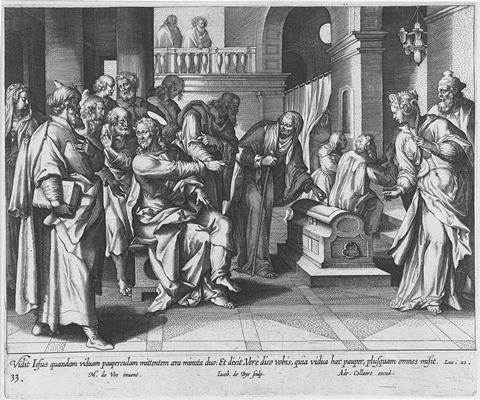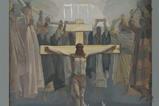Elaine Storkey challenges the usual interpretation of the New Testament story of the widow’s offering, and reveals what we can learn from it today

Study passage: Luke 21:1-4
I wonder how many sermons you’ve heard on giving. Over the years I have heard dozens, and many of them have focused on the story in the gospels about the widow’s offering. It seems to be a favourite for preachers, especially when urging those in their church to be more generous with giving.
It is easy to see why this story seems appropriate. Jesus and his disciples were in a court at the temple, watching different people take their gifts to the temple treasury. As the coins clinkered down on to the metal, they noticed how much the wealthy donors were giving. Then, a poor widow stepped forward and put in “two very small copper coins” (v2). Jesus pointed out the contrast to his followers and made an important economic observation: “This poor widow has put in more than all the others. All these people gave their gifts out of their wealth; but she out of her poverty put in all she had to live on” (vv3-4).
In other words, she gave a much higher percentage of her income than anyone else; her generosity was sacrificial, whereas the generosity of the others was perfunctory. The conclusion that preachers often draw is that Jesus was commending the widow for her unselfishness and reckless benevolence. The message to us is that her generosity should be our role model; whatever our circumstances, we should show the same sacrificial outpouring when we give.
What is the passage really saying?
Over the last few years, however, I have begun seriously to doubt this interpretation. There is no doubt that Jesus was describing something factually true. Proportionately, the widow indeed gave far more of what she had than the rich. But we seem to be missing something if we think he is advocating this as a principle. Did Jesus really want someone so poor to give everything she had to live on? Was he really wanting her to become destitute in order to give to the temple?
The temple was rich and magnificent. The disciples remarked on how it was adorned with beautiful stones and gifts dedicated to God (v5). It would be strange indeed if Jesus was suggesting that the poor widow’s last meagre copper coins should also go to the temple authorities. For how would she live when she had given everything away? What would she do for food?
The widow was a live example of the corruption and hollow spirituality of the teachers of the law
The ‘role model’ interpretation really doesn’t ring true. So many times in the Hebrew scriptures we read the opposite, about the need to protect the vulnerability of widows and make sure they are not taken advantage of. We’re told that the care and wellbeing of widows is important to God. He is a “father to the fatherless, a defender of widows” (Psalm 68:-6). Far from encouraging the poor’s destitution, God “tears down the house of the proud, but he sets the widow’s boundary stones in place” (Proverbs 15:25). In other words, he makes sure they have enough to live on.
God does this by placing the responsibility of care on the shoulders of his people, especially the religious leaders who teach and preach in God’s name. In the Old Testament they were instructed to “plead the case of the widow” (Isaiah 1:17). They were not to mistreat widows; God would hear their cry if they were (Exodus 22:22-3). No one was to take a widow’s coat as security for a loan (Deuteronomy 24:17). Fruit was to be left on olive trees and grapevines so that widows and others in need could gather them. (Deuteronomy 24:20). A key responsibility of those in authority was to ensure that the vulnerability of widows was not exploited.
So this immediately raises a question about the widow in the gospel story. Why was she so poor? If the spiritual leaders and those commissioned to look after her wellbeing were doing their job, she should not have been at the end of her resources. She should always have had sufficient to live off. The answer comes in the previous chapter where Jesus warned his disciples not to be taken in by the prayers and piety of the scribes and Pharisees.
So many of those who taught the law wanted to be adulated and praised as pious. They were self-important, parading around, sitting in places of honour at banquets and in synagogues. But in a very telling accusation, Jesus exposed them as unjust hypocrites, telling his disciples: “They devour widows’ houses and for a show make lengthy prayers” (Luke 20:46).
Revealing hypocrisy
In a patriarchal society like Israel, widows had little or no power in the courts and needed to be legally protected when their husbands died. It was not uncommon for a husband to appoint a scribe or legal expert to take care of his assets after death on behalf of his wife. What Jesus was pointing to was the fact that these religious executers were often corrupt; many found loopholes to make sure most of the estate left by a widow’s husband would end up in their own hands. Not only were they ignoring a widow’s need for care, they were violating God’s command.
So the reason this widow was so poor may well have been because she was cheated out of what she should have had, and neglected by those who should have ensured her justice. Yet, despite all that, she was the one who still obeyed the law – she still gave what was required of her to the temple.
Jesus made many serious allegations against the self-interest and hypocrisy of those with religious power, often using parables about barren fig trees and fruitless vineyards to get his point across. The Pharisees, Herodians and Sadducees all suspected he was telling his parables against them, and constantly attempted, without success, to discredit him. But in this instance he didn’t use a parable. He didn’t need to. The poor widow was a live example of the corruption and hollow spirituality of the teachers of the law, and the impact their cheating had on the vulnerable.

What can we learn from the story today?
People who urge Christians to give generously do have the backing of both Old and New Testaments. Jesus himself said we should give to the needy without making a show of it and Paul urged Christians to give money to support Gospel ministry. But this particular story is not really about giving; it is about truth, justice and compassion. Three important messages stand out for us today.
The first is the need for personal integrity. Since we face temptation every bit as much as those religious law-makers we should be very careful that we do not fall into hypocritical living. We expose ourselves to that risk whenever we want the approval or affirmation from others more than we want to live truly and spiritually before God. The way we live in our secret lives shows what is in our hearts and often we need God’s help to get this right.
Here in the UK, it is likely that poor people pay a higher proportion of their income in tax than the rich
The second is the need for public justice and accountability, especially in relation to policies that affect the poor. The legal people got away with exploiting the widows in Jesus’ day because they could. Today we have tax loopholes that benefit the rich and allow them to stash away their wealth in tax havens. Here in the UK, it is likely that poor people pay a higher proportion of their income in tax than the rich. Working out fair and just policies, which protect those with few assets, is the duty of any good government and something we should require of them.
The third is the need for Christian compassion towards the poor and marginalised. When I was in Uganda I met a widow who had been stripped of all her husbands’ possessions after he died. ‘Relatives’ she had never seen brought claims that his property and belongings were theirs. Now without a home, she and her children were helpless until Christian believers across the area came together and found her somewhere else to live, providing for her needs from their own resources. They then fought her case and had the ‘relatives’ exposed and convicted as cheats and liars and ensured compensation was awarded to the widow.
Justice and compassion should be high on the list of what motivates us. We are to resist those who deny justice to the vulnerable and call them to account. Many Christian organisations do that and need our support. Tearfund, Christian Aid, Cafod, Open Doors, Restored, Just Love, Armonia, Hope into Action all challenge injustice and advocate on behalf of the poor. Widows, especially, are emotionally vulnerable already, having lost the person they love. Let’s make sure they don’t also have to struggle to find food for their children.

































No comments yet